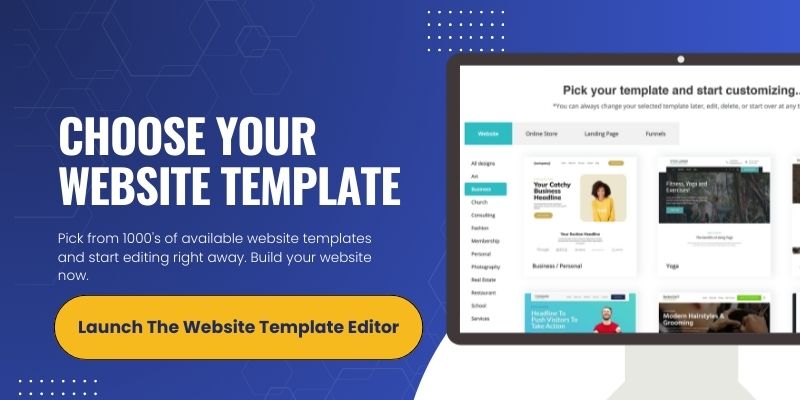Crafting a Stellar Homepage
The Importance of First Impressions
When visitors land on your homepage, it sets the stage for their entire experience. Think of it like meeting someone for the first time—you want to make it memorable! Your homepage should reflect your personality and style as an author.
Make sure your design is visually appealing. A well-organized layout with high-quality images can grab attention quickly. Consider using a clean design that showcases your book covers, recent blog posts, or latest news about your writing endeavors.
Don’t forget to incorporate your brand colors and fonts consistently. This isn’t just about aesthetics; it’s about creating a space where readers feel welcome and motivated to explore more.
Key Elements to Include
Your homepage typically needs a few essential elements: an engaging headline, a brief bio, and clear navigation. Start with a catchy tagline that encapsulates your writing journey and what readers can expect from your site.
Include a concise bio that highlights your accomplishments and writing style. This is where you can connect on a personal level by sharing a little about your inspirations or writing process.
Lastly, make sure your navigation is intuitive. If readers can’t find their way around, they might leave before discovering all the fantastic content you have to offer!
Call to Action is Key
Navigating your website should lead to a clear call to action. Whether you want visitors to sign up for your newsletter, buy a book, or follow you on social media, make it obvious what you want them to do.
Using buttons with actionable words like “Join Now,” “Shop Here,” or “Explore My Books” can entice readers to engage more with your work.
This step helps build your community and visibility. After all, the more engaged your readers are, the more they’ll spread the word about you!
Engaging Blog Section
Why a Blog Matters
A blog is a fantastic way for authors to connect with their audience. It’s like having a conversation where you can share stories, insights, and writing tips.
Writing regular blog posts not only keeps your site dynamic, but it also improves your site’s SEO. When you regularly publish content, Google notices, which can lead to better rankings and more visibility.
Your blog is your space to let your personality shine. Share personal anecdotes, writing challenges, or book recommendations—anything that gets you talking about your passions can resonate with your readers.
Content Ideas for Your Blog
Now that you know why a blog is important, let’s brainstorm some content ideas! Consider writing about your writing process, tips for aspiring authors, or behind-the-scenes looks at your books.
You can also share book reviews, highlight literary events, or discuss current trends in your genre. These posts can position you as a knowledgeable voice in the writing community.
Remember to stay authentic and speak in your voice. Readers appreciate honesty, and it encourages them to be part of the conversation.
Promoting Your Blog
Once you’ve got some fantastic posts, how do you get them out there? Share your blog on social media platforms where your target audience hangs out. Engage with your followers by asking for their thoughts on your posts; it builds a sense of community.
Consider guest blogging on other author sites to tap into their audience as well. This cross-promotion can be a powerful way to expand your reach.
Lastly, don’t underestimate the power of an email newsletter. Notify your subscribers whenever you post something new to keep them in the loop!
Showcasing Your Books
Creating Compelling Book Pages
Your books deserve the spotlight, right? Dedicate individual pages for each of your works, complete with stunning cover images, enticing summaries, and reader reviews.
Each book page should include essential information like publication dates, links to purchase, and any accolades your book has received. This not only informs readers but also encourages them to make a purchase.
If you have an engaging book trailer or sample chapters, consider including those too. These elements can captivate potential readers and push them closer to hitting that buy button!
Reader Reviews and Testimonials
Social proof is a powerful motivator. Adding testimonials and reviews from readers can boost credibility and help others make the decision to buy your book.
Encourage readers to leave reviews on your site or provide links to their reviews on platforms like Goodreads or Amazon. Positive testimonials can convey enthusiasm and convince potential readers to take a chance on your writing.
Don’t be shy about showcasing your accomplishments! Share any reader awards, accolades, or features in book clubs and blogs. It helps establish you as an author who is respected and loved in the literary community.
Linking to Purchase Locations
Make it easy for readers to buy your book by providing clear links to various retailers. Whether it’s Amazon, your local bookstore, or your own online shop, let them know where they can get their hands on your writing!
Adding buttons that say “Buy Now” or “Available Here” helps guide readers directly to the purchase page, minimizing any chances of them getting distracted along the way.
Additionally, consider using affiliate links for any online retailers. This way, you can earn a little something additional for your efforts if readers decide to purchase through your links.
Building Your Author Brand
Your Unique Voice and Identity
Your brand is more than just a logo; it’s about the essence of who you are as an author. Your writing style, themes, and even your interaction with readers contribute to this identity.
Get clear on what you want your brand to represent. Are you focusing on thrillers, heartwarming romances, or humorous essays? Your niche will play a significant role in how you market yourself.
Always express your unique voice in all your communications. Whether it’s through your writing, social media updates, or blog posts, consistency is key to building recognition.
Creating Visual Elements
Visual branding extends to your website design, including your color scheme, typeface, and imagery. Choose colors that resonate with your genre and personality, and ensure they are consistent across all platforms.
Consider professional photography for your author bio and images. Having high-quality visuals can create a strong first impression and portray professionalism.
Don’t forget about graphics—think about creating appealing graphics for quote snippets or promotional materials that you can easily share online. It’s a fun way to engage with your audience and promote your work simultaneously.
Consistency Across Platforms
To establish a strong brand, make sure your voice and visuals are consistent across different platforms. Whether on your website, social media, or in your newsletters, your audience should feel like they’re experiencing the same you everywhere they go.
Tweak your messaging to fit the platform, but always keep the core identity intact. This way, readers can resonate with your brand regardless of their point of entry.
Consistency builds trust, and as readers come to know and recognize you, it deepens their connection to your work. Just imagine the power of a loyal fanbase that loves you for your authentic self!
Enhancing User Experience
The Role of Navigation
User experience means ensuring that visitors can move throughout your site without frustration. Simple, straightforward navigation is essential. Organize content logically, so users can easily find what they’re looking for.
Consider including a search bar for those who prefer to look for specific content. It’s a small addition but can significantly enhance the usability of your site.
Test the flow of your website frequently. Ask friends or family to navigate it and provide feedback. If they struggle, it might be worth re-evaluating your layout.
Mobile Optimization
With more people browsing on mobile devices, ensuring your website is mobile-responsive is a must. A site that isn’t mobile-friendly can deter visitors and leave a negative impression.
Check how your website looks on various devices and adjust as necessary. It’s important that the text is readable and images adjust appropriately for smaller screens.
Mobile optimization also includes fast loading times. A slow site can frustrate users and lead to high bounce rates. Consider optimizing images and minimizing the number of plugins.
Interactive Engagement Features
Consider incorporating features that encourage interaction, such as comment sections or forums where readers can discuss your work or share their thoughts. This creates a community around your writing.
You might also add polls or surveys to gather reader opinions about what they want to see next. Not only does this engage users, but it makes them feel valued.
Don’t shy away from utilizing social media platforms for real-time engagement. Encouraging readers to tag you in their posts or comment on your content can help bolster those connections even more.
Staying Connected with Your Audience
Email Newsletters
Don’t overlook the power of an email newsletter. It’s one of the most direct ways to connect with your readers. Keep them in the loop with updates, upcoming releases, and exclusive content.
You can also use newsletters to share personal insights or anecdotes about your writing journey, making readers feel more involved in your narrative.
Be sure to craft engaging subject lines; this is the first thing your readers will see and can make a huge difference in open rates. Use it as an opportunity to spark curiosity!
Social Media Engagement
Your social media platforms are also crucial for staying connected. Share snippets of your writing, personal stories, or even host Q&A sessions to engage directly with your audience.
Be authentic and approachable. Followers are more likely to engage with you when they feel they’re connecting with a real person.
Utilize platforms relevant to your audience, whether that’s Instagram, Twitter, or TikTok, and tailor your content accordingly. Just have fun with it and let your personality shine!
Virtual Events & Book Signings
In a digital age, hosting virtual events or book readings can add a personal touch. This allows you to interact with readers from around the world without the constraints of geography.
Consider using platforms like Zoom or Facebook Live to host discussions about your work, answer questions, or simply chat about writing. It’s a great way to foster community.
On top of that, where possible, physical book signings can be a fantastic way to connect with your readers face-to-face. It builds a rapport that can be very beneficial for your author brand.
Conclusion
Establishing your online presence as an author involves a well-structured website filled with engaging content, a robust brand identity, and active communication with your readers. By utilizing these templates and tips, you’ll be on your way to creating a platform that not only resonates with visitors but also showcases your talent and passion for writing.
Remember, it’s all about connecting with your audience and providing them with an exceptional user experience. The journey of an author is filled with creativity and discovery—your website should reflect that!
FAQs
1. How do I choose the right template for my author website?
Consider your genre and personal style when selecting a template. Look for designs that allow you to showcase your content effectively and beautifully resonate with your target audience.
2. What should I include on my homepage?
Your homepage should feature a captivating headline, a brief bio, navigation to other pages, and clear calls to action, guiding users to explore further.
3. Are blogs necessary for an author website?
While not mandatory, blogs help engage your audience, improve SEO, and showcase your personality and expertise in writing.
4. How often should I update my website content?
Regular updates are essential. Aim for at least a monthly blog post and frequent updates on book releases or events to keep your audience engaged.
5. What role does social media play in building my online presence?
Social media is vital for connecting with your audience, promoting your content, and creating a community around your work. Engaging authentically can significantly boost your visibility.

